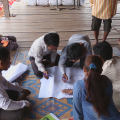Dr Chayanis featured in media about enhancing water cooperation in the Lancang-Mekong Basin
SUMERNET program director Chayanis Krittasudthacheewa recently featured in the China Daily about the importance of Lancang-Mekong cooperation in tackling climate change
Lancang-Mekong countries need to enhance cooperation over water management to tackle extreme weather challenges triggered by climate change, according to experts.
Chayanis Krittasudthacheewa, deputy director of Stockholm Environment Institute’s Asia Centre in Bangkok said, “More frequent extreme events such as drought, heat wave and floods in many parts of the world including the Lancang-Mekong region are a clear effect of climate change and show the need for countries to reduce greenhouse gas emission as soon as possible.”
The Lancang-Mekong Cooperation, or LMC, was established in 2016 and brings together countries situated along the Lancang and Mekong River. Member states include China, Cambodia, Laos, Myanmar, Vietnam and Thailand.
Known as the Lancang in China, where it originates, the 4,900-kilometer Mekong River is the largest in Southeast Asia.
Krittasudthacheewa, who is also the director of the Sustainable Mekong Research Network, or SUMERNET, said LMC countries should seek the opportunity to learn from each other about how they can engage with the stakeholders to effectively manage water and protect the ecosystem during these extreme events.
Read the full article here.
Info
This story is part of the following project
SUMERNET 4 All: Engaging with water insecurity in the Mekong Region
Topic
Country
Related people
You might be interested in
-
SUMERNET Vision Guide introducing the new phase "SUMERNET 4 All"
The new, revised "Vision Guide" for SUMERNET is now available. This vision guide presents an overview of SUMERNET - its origins and governance structure, background to the network, aims, key research areas, engagement with policy, and outreach products
![SUMERNET Vision Guide introducing the new phase "SUMERNET 4 All"]()
-
SUMERNET 4 All Call for Proposals on Joint Action
SUMERNET 4 All (S4A) provides financial support and technical assistance to consortia of researchers and boundary partners from the Mekong Region
![SUMERNET 4 All Call for Proposals on Joint Action]()
-
SUMERNET launches redesigned website to provide a fresh visual look and direction
SUMERNET is proud to announce the launch of our redesigned website to coincide with our new phase of work on addressing water insecurity in the Mekong Region.
![SUMERNET launches redesigned website to provide a fresh visual look and direction]()
 By
By 




 Read more about SUMERNET
Read more about SUMERNET
